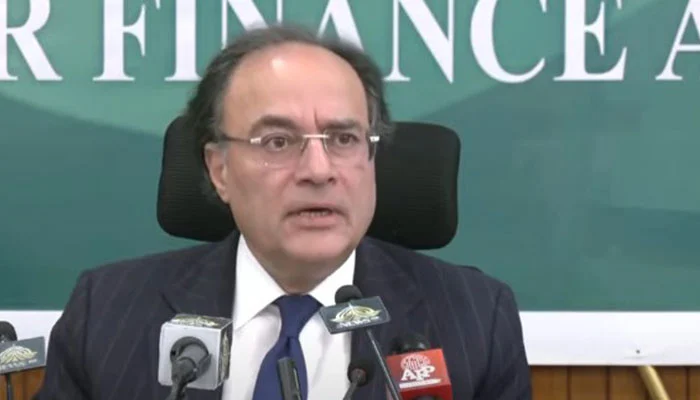ISLAMABAD – Finance Minister Muhammad Aurangzeb has highlighted the urgent need for tariff reforms, calling them critical for economic stability and export growth. Speaking at a post-budget press conference on Wednesday, he said such reforms were overdue by three decades.
“These tariff reforms have been ignored for the past 30 years,” the minister stressed. He explained that the changes would not only boost economic progress but also help increase exports. The government has reduced tariffs to zero on 4,000 out of 7,000 tariff lines.
The press briefing was delayed due to a walkout by journalists. Reporters protested the absence of a technical briefing from the Federal Board of Revenue (FBR), which is usually part of budget discussions.
The event followed the presentation of the federal budget worth Rs17.57 trillion for Fiscal Year 2025-26. Prime Minister Shehbaz Sharif’s government has set a GDP growth target of 4.2% and plans to cut overall federal expenses by 7%.
The budget forecasts a 3.9% deficit and projects inflation to remain around 7.5%. Defence spending is set to rise by 20.2%, reaching Rs2,550 billion. At the same time, the government aims to collect Rs14,131 billion in taxes — an 18% increase from last year — pushing the tax-to-GDP ratio to 10.1%.
To provide relief to salaried individuals, new tax brackets have been proposed. The minimum tax rate for people earning up to Rs2.2 million yearly will drop to 4% from 15%. Those making between Rs600,000 and Rs1.2 million annually will see their rate fall from 5% to 2.5%.
Strict actions are also suggested against non-filers. If passed, the proposal will prevent non-filers from using Pakistan’s financial services. This is part of a broader effort to widen the country’s tax base.
Focusing again on tariff reforms, Aurangzeb said this policy change was necessary for long-term growth. He described the reform as a structural shift aimed at modernizing trade and improving Pakistan’s export potential.
He also discussed the linkage of pensions and salaries with inflation. “We need a proper benchmark,” he said. “Whether it’s the public or private sector, salaries and pensions should be tied to inflation indicators.”
The finance minister announced that small-scale farmers would receive low-interest loans. He assured the public that the government was committed to offering relief, though he cautioned it must align with available financial resources.
Aurangzeb clarified that no new taxes were imposed on the agriculture sector. “Relief can only be given within our economic limits,” he explained.
He reiterated the current inflation rate stands at 7.5%. The government has decided to limit federal spending to just 2% this time to manage fiscal responsibility.
“Our budget begins with a deficit,” he acknowledged. He also admitted the country has faced rising debt year after year. “Despite these challenges,” he added, “some spending is unavoidable. We must move forward within our means.”
Concluding the session, Aurangzeb noted that the government is operating through loans. “Whatever we are offering,” he said, “we’re doing it by borrowing.” He called for continued efforts in tariff reforms, economic planning, and fiscal management to steer the country out of its financial woes.


